By KATIE EUBANKS; Photos by STEGALL IMAGERY
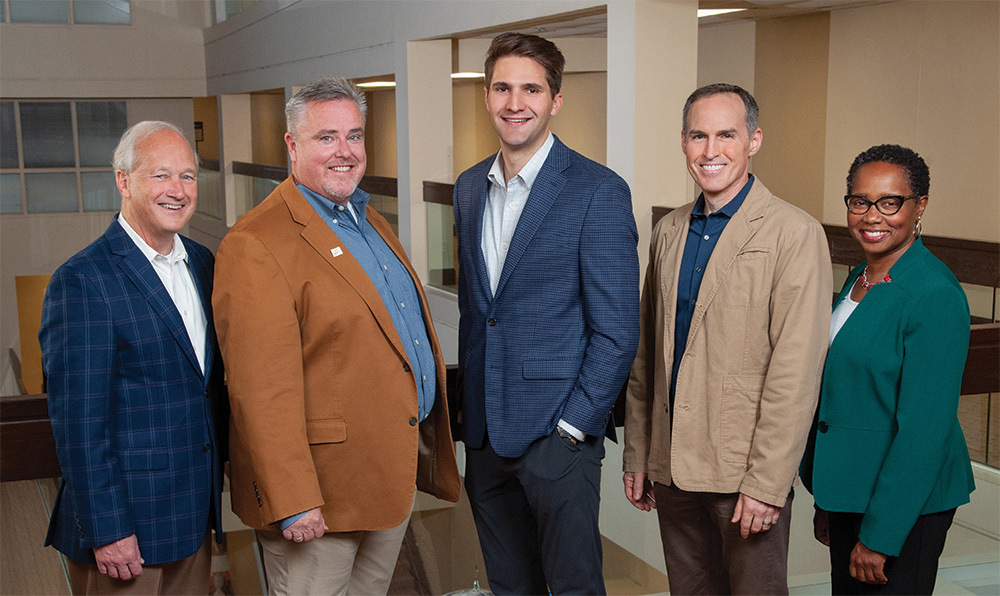
From left: Tom Washburn, minister to senior adults at First Baptist Jackson; Matt Nalker, executive director of The Arc Mississippi; Jonathan Lancaster, CFO of We Will Go; Preston Crowe, counseling pastor and director of The Center for Hope and Healing at Broadmoor Baptist Church; and Angela Carson, founder of the Pine Grove Association and Carson Consulting Services.
For the fourth year in a row, MCL has taken nominations for Christian Leaders of the Year. This year the five selected leaders met together for a group interview at First Baptist Jackson with MCL Editor Katie Eubanks. The conversation was as impactful as anything you’d hear at a leadership conference! The following is a brief introduction of each Christian Leader of the Year, followed by an excerpt from the group interview, edited for space and clarity. (Listen to the full conversation on the MCL podcast, “A Closer Walk,” available on Apple Podcasts or Spotify. Just search “Mississippi Christian Living.”)
Part 1: The leaders
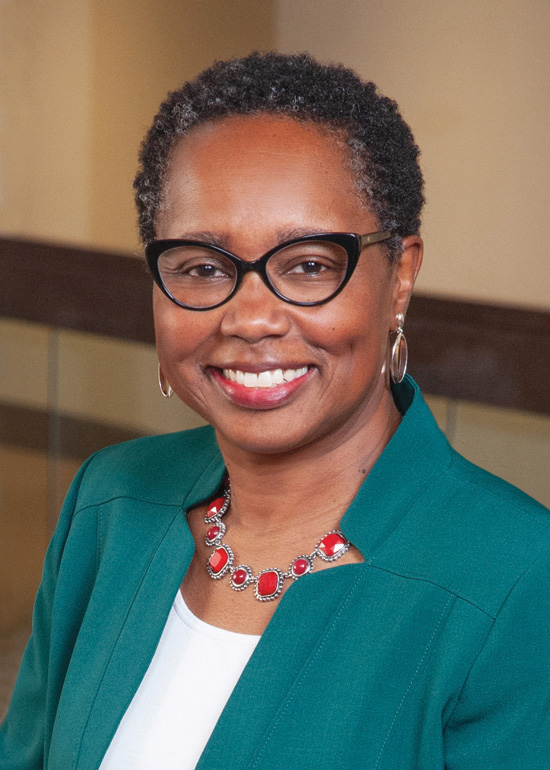
ANGELA CARSON
● Founder and executive director of the Canton-based Pine Grove Association, which serves youth, the elderly, the Hispanic community and others.
● Founder and president, Carson Consulting Services, which offers training, consulting and coaching for nonprofits, small businesses and government entities.
● Member, secretary and Sunday school teacher at Priestley Chapel Missionary Baptist Church, Canton.
From her nomination:
“Angela displays love and concern for those in need at all times, but especially when a person needs encouragement, when their spirits are low, and circumstances are difficult. In other words, her leadership enables her to jump aboard the ship with those experiencing hard times and help them ‘ride out the storm.’” – Verna M. Myers, friend and colleague
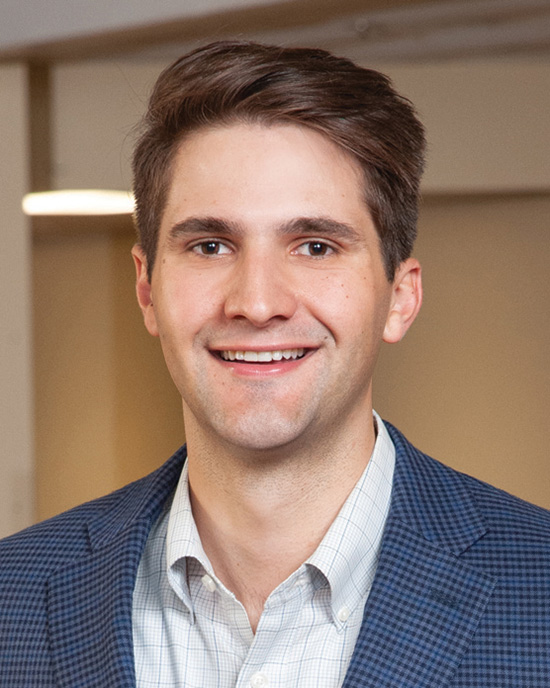
JONATHAN LANCASTER
● CFO of We Will Go, a downtown Jackson ministry that engages the community with the love of Christ through education programming, a food pantry and more.
● Member of Redeemer Church, PCA, Jackson.
● Married to Frances, father of Charlie.
From his nomination:
“(Jonathan’s) call to action in great crisis (during COVID-19) resulted in tremendous program growth, not loss. We were able to serve more families and students than we’d ever thought was possible.” – Mariah Pitre, director of education, We Will Go
From another co-worker:
“It was very overwhelming for me (when I first started working at We Will Go). Everyone sees you, but do they really see you? And Jonathan, even without saying it, reassured me of that.” – Ashten Jones, director of engagement, We Will Go
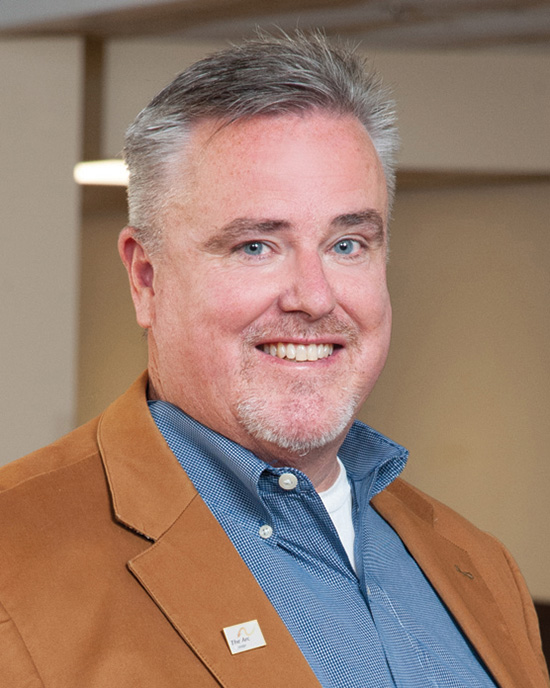
MATT NALKER
● Executive director of The Arc Mississippi, which primarily serves people with intellectual and developmental disabilities but also people who have serious mental illness or who need substance abuse treatment.
● Member of Immaculate Conception Catholic Church, Raymond.
● Married to Lacey, father of Brooke, Logan, Courtney, Lili, Greta and Gage.
From his nomination:
“You will find (Matt) learning about someone’s needs every day in whatever setting they may be in, such as jail, institutions, nursing homes, crisis centers, hospitals, or under a bridge. … he is the personal medical care decider for over 200 mental health persons.
“Matt got a call one day (about) a man experiencing a mental health crisis and who was about to be homeless. As he investigated the options, he learned that many people were falling through cracks in our state’s systems. … Using one man as example, Matt advocated for a ‘buck stops here’ resource that can address crisis in its many forms that is not exclusive to one system or diagnosis. SPOTT was formed. It is now eight years later …. Hundreds of people are helped through this process each year.” – Dan Hall, friend and colleague
How Matt got involved in The Arc:
“Our oldest child was born with a profound intellectual disability. So I’m a horticulture major that got involved with human service trying to help find services for my daughter and along the way realized it was a much bigger need out there in the world.”
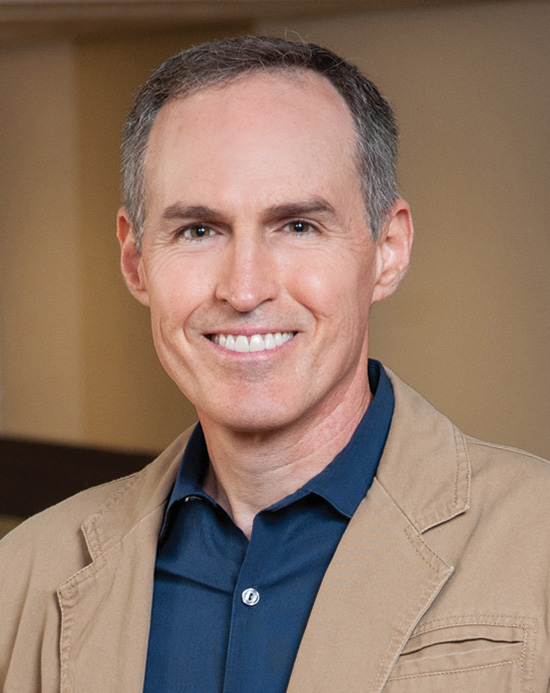
PRESTON CROWE
● Counseling pastor and director of The Center for Hope and Healing, Broadmoor Baptist Church, Madison.
● President, Global Concern Inc. (GCI), a Mississippi nonprofit that shares the gospel and facilitates sustainable community development in northern Kenya.
● Married to Jennifer, father to Mason, Dawson, Colton, Ashlyn and Bella.
From his nomination:
“With Preston as its president, GCI has now finished two wells with clean water (in) northern Kenya. They are currently working on piping the clean water closer to the village of Kargi … Preston meets with the elders on a regular basis and is a strong godly presence in the lives of so many people there. Northern Kenya is truly the ends of the earth and Preston’s leadership to not only the Kenyans, but to those of us that go help serve … is a huge asset.” – Tracy Ashworth, friend and life group member
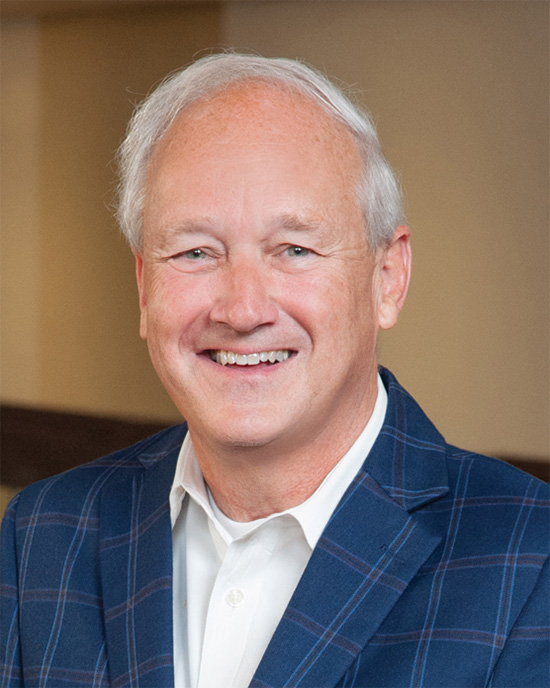
TOM WASHBURN
● Minister to senior adults, First Baptist Jackson.
● Married to Dr. Gina Heath.
From his nomination:
“Because FBJ does not have regularly scheduled Sunday evening services, which most of us have attended all our lives, Tom and Eva Hart began ‘Classic Sunday Nights,’ which meets in the chapel at 6 on Sunday evenings during summer months especially.” If we had to put somebody out of college, he was already in his mind making the plan for them to come back. – Martha Stockstill, church member and former co-worker
Part 2: The conversation
Katie Eubanks: I’d love to hear what Christian leaders have influenced each of you.
Angela Carson: My mom, just in (my) growing up. In those morning routines, she would have gospel music playing. Her words of encouragement … She’s a retired social worker. She was quiet in nature. She would just be that calm. (She modeled) time with God.
Also my pastor, Rev. Robert McCallum. … He’s my boss but also my pastor. He models treating those who have not treated you as they should. I’ve (also learned from him), ‘Every excuse is a good excuse … but what is it that God wants you to be doing?’
Matt Nalker: I would say the parishioners of my church. I’m an Army brat … and we finally settled in Raymond (and attended Immaculate Conception). I still go to church with (those same people) now.
Now I’ve realized, ‘Gosh I’m that old guy that encourages that young couple who comes into the church. … Wow, that’s your role.’
Preston Crowe: I learned a lot from my dad in terms of what it means to be a Christian leader in a business setting. He worked at the same company for over 50 years and taught me a lot about hard work and sticking with something over the long run.
I had back-to-back youth ministers who really impacted me. We lived an hour from New Orleans, so we had seminary students (as youth pastors). Aaron Johnson was ex-military, ex-Green Beret. He was the first one who called something out in me in terms of leadership and believing in me. Gary Cornelius also invested tons in me … I remember Gary calling me one time (and asking), ‘Can you lead tonight?’ I was in maybe ninth grade, 10th grade.
The next one would be my wife’s dad. He was a preacher, and people called him Preacher. He probably taught me more of the grit of ministry.
Tom Washburn: My parents. I don’t know that there’s ever been a day they didn’t pray for me. They are 90 and 91 years old, and every morning they pray, and every night before they go to bed, they sit in these chairs right next to each other and hold hands and pray.
Frank Pollard was pastor here for 25 years. I don’t know that I’ve ever known anybody who loved the Lord and knew how to communicate it as well as he did.
And Dr. (Van “Doc”) Quick. Dr. Quick was my boss at (Mississippi College). For him, student discipline was always redemptive. If we had to put somebody out of college, he was already in his mind making the plan for them to come back.
Jonathan Lancaster: Martin Luther said the job of a Christian cobbler wasn’t to put crosses on all the shoes, but to make the best shoe. Before I was in the role that I’m in now, I worked at United Way of Atlanta, and my boss there, Claire Burke, just really exemplified that and showed me you could have a high standard for work within the space of helping people.
And I would say my dad was the second person. He really challenged me to go for something. It was kind of a leap to come into this role, so he challenged me (to) do it while you can. … It took him till he was in his 40s to go into ministry.
MN: You said something (Jonathan) that reminded me that as we get older … My kids, they inspire me. My older kids — we’ve always prayed before we went to bed every night. And the older girls that are in college now will come home late at night and say, ‘Did I miss prayer?’
TW: And you know something, Matt, that you said awhile ago about the people in your church. Golly, how the people at First Baptist Church Jackson have inspired me! I’ve worked mostly with senior adults here. And oh my goodness. They keep it real.
PC: They’re prayer warriors, too. I was thinking of Ms. Triplett earlier today, because I interned here at First Baptist for a couple years in college. And I remember her just praying for so many people, and she would catch me in the hallway and say, ‘I prayed for you today,’ and she meant it.
MN: You’re exactly right. In the world of work that we all do on some level, working with folks that are truly in crisis, and you don’t have words, you pray to God that you have words of healing or words of inspiration for folks. But ultimately it comes down to, brother, sister, let’s just pray for a minute that God will intervene — because we don’t have the words to ‘fix’ a situation.
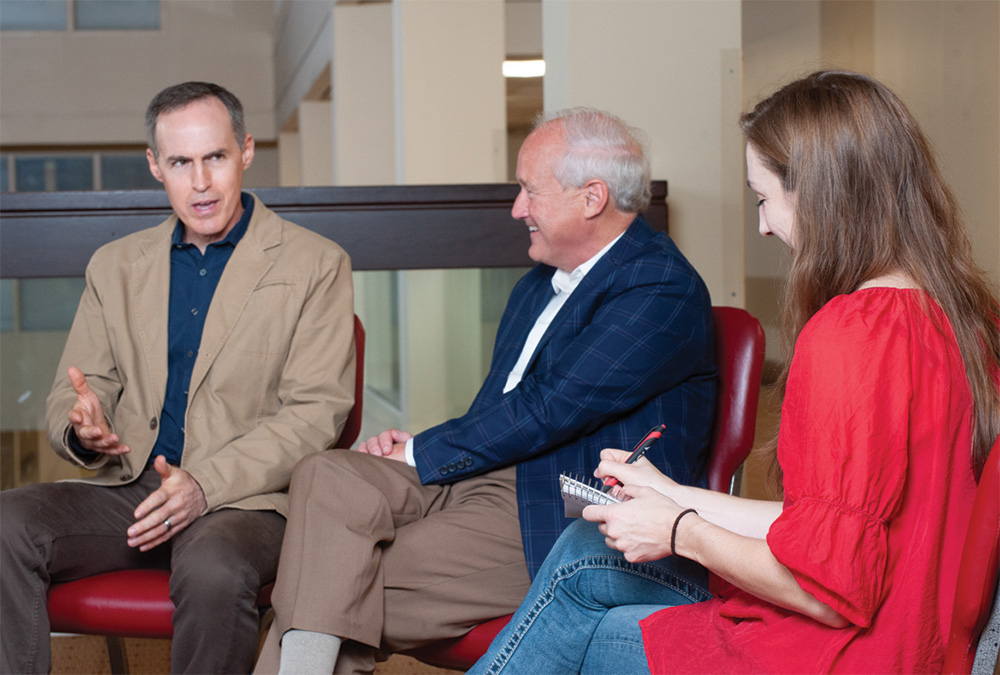
“I have had people accuse me of being patient. I am not. I got trained somewhere along the way,” says Preston (far left).
KE: What’s the biggest lesson God has taught each of you about Christian leadership?
MN: Listen more and talk less. My old Army sergeant dad told me when I was 2: ‘You’ve got two ears and one mouth, son.’
TW: The word ‘leadership’ scares me to death. So many people get messed up thinking they’re a leader. … We need to be pointing at the One to follow. You’re going to be really disappointed if you follow me. Follow Jesus.
AC: I’m learning it’s not about me. My pastor has helped me see that. … We signed on to be Christians.
There’ve been times I’ve been called to go and do, and I didn’t want to do it. He’s going to call us sometimes when it’s not convenient. Will we answer the call?
PC: (For me it would be) patience. I have had people accuse me of being patient. I am not. I got trained somewhere along the way.
I’ve realized, especially through counseling — maybe they have a quick decision to make, and they just need some help with it, but others may have a burden they’ve been carrying for years. I have to be patient to see God work.
We’ve seen that a lot in Africa (through Global Concern) too.
TW: Don’t you find that the change that comes slowly lasts longer?
PC: That is always the case, yes.
JL: Something I say to my team all the time is, we need a higher tolerance for failure. … We don’t try because we’re afraid to fail.
MN: And gosh, what you learn by failing.
PC: I have a handwritten note that I took during some type of a leadership summit I think, and I look at it often: If you wait until you’re 100 percent sure, you’ll always be too late.
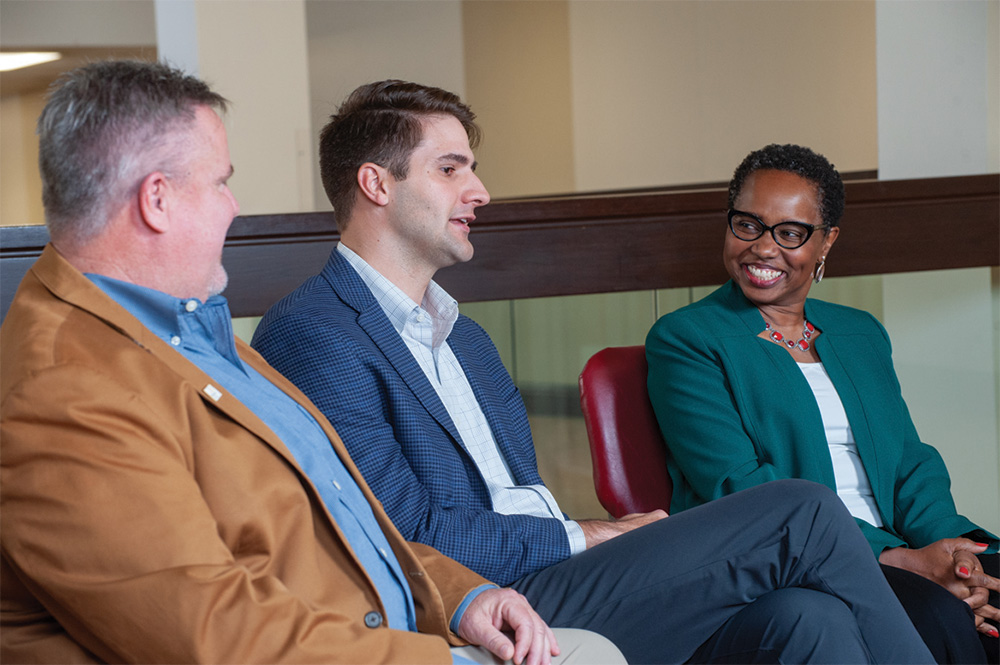
“I’m always analyzing, how is our thing running? But the exciting thing on the other side of that is the people (we serve). So that’s the drive,” says Jonathan (center).
KE: This question is for all of you, too: What is your favorite part of your job?
MN: It has to be the next person I get to meet. … They inspire me, they teach me, they make me want to come to work.
JL: I’m a numbers, structures kind of guy … In order to (provide food) for 15,000 people, we’ve got to figure out how to get a truck to get food and coordinate all these things. So I’m always analyzing, how is our thing running? But the exciting thing on the other side of that is the people. So that’s the drive.
I want to raise as much money as I can, I want to be efficient, but the outcome is I want to help as many people as possible.
PC: The first thing that came to mind was the joy of being part of people’s lives who are opening up about things they’ve never shared before. … The courage I see for them to take that first step.
AC: I would say the flexibility to be able to meet new people, work with new children and learn from them. … And variety. Every day is different, my audience may be different, but I still see and have found that there’s an angle of ministry in it. Even with the business. You know, I was criticized early on, ‘You’re not charging for (some of) your services (right now).’ Well, I know but, they need help, right?
Ministry, I just can kind of look back and just see that it’s shown up throughout the journey. And ministry can be fun. It’s not all just the mundane, hard stuff.
TW: I do 40, 50 funerals a year. Even in those hard times, to see people going through the hardest thing in the world, they find fun things to laugh about.
KE: How would y’all encourage somebody who’s wrestling with their calling or self-doubt as a leader?
JL: There’s this big narrative in our culture (that) you’ve got to do this big thing. … I love this other quote, it’s some proverb: When I was young, I set out to change the world … then I got old and realized I should’ve started with myself.
MN: A lot of the people we help, fight us (because they’ve) always been helped. I think for me, I don’t like somebody to help me, because I’ve got a so-called plan. And I’ve realized as I get older and more experienced, that it’s OK to listen to what you say, and part of your plan can be my plan. I don’t have to know everything.
Open up to (receiving) help.
AC: I share this with women at the church: Just try it. Just help somebody. The more you do it, the easier it becomes, and there’s so many rewards in knowing you helped somebody.
PC: If I could speak to a younger version of me, I would say, your calling is to follow the Lord. How that looks might change. … I felt called to ministry before I really knew what that looked like. That was frustrating at first, but now I realize it’s allowed me to make some transitions.
Let God show you how to lead.
TW: And then be so, so careful not to think leadership is more important than loving.

